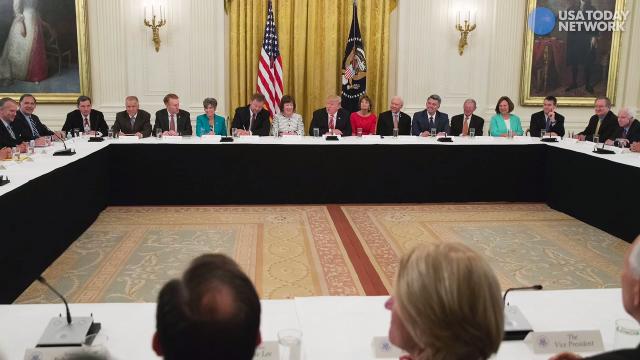How Zuckerberg's Meta Will Adapt To A Trump Presidency

Table of Contents
Increased Scrutiny of Content Moderation Policies
A second Trump presidency would likely reignite the already intense debate surrounding Meta's content moderation policies. The platform has consistently faced criticism from both sides of the political spectrum, but a Trump administration would likely amplify the voices expressing concern from the conservative perspective.
Re-emergence of Conservative Complaints
Expect renewed pressure from conservative voices claiming bias in Meta's content moderation policies. This pressure will likely manifest in several ways:
- Increased calls for Section 230 reform: This could lead to significant legal challenges and stricter regulations impacting Meta's operations and ability to moderate content effectively. The debate surrounding Section 230 and its implications for social media giants like Meta is likely to intensify.
- Renewed focus on alleged censorship of conservative viewpoints and personalities: Claims of censorship will likely be amplified, leading to increased public scrutiny and potential investigations. The accusations of bias in algorithms and content removal processes will be a key focus.
- Potential for legislative action targeting Meta's algorithms and content moderation practices: Congress might introduce new legislation directly impacting Meta's ability to moderate content, potentially forcing the company to make significant changes to its algorithms and policies.
Meta's Response Strategy
To mitigate these risks, Meta might adopt several strategies:
- Prioritize transparency in its content moderation processes: This could involve establishing independent external review boards to assess the fairness and consistency of content moderation decisions, increasing public trust and accountability. Publishing more detailed content moderation reports would also boost transparency.
- Increased investment in AI-powered content moderation tools: Sophisticated AI can help automate the process, potentially reducing human bias and improving efficiency. However, ensuring fairness and avoiding unintended consequences will be crucial.
- Proactive engagement with conservative groups and influencers: Open dialogue and collaboration could help address concerns and build trust, potentially preempting some criticisms.
- Potential adjustments to community standards: Meta might need to refine its community standards to more explicitly address concerns raised by conservative groups, while still protecting vulnerable populations from hate speech and harassment.
Navigating the Regulatory Landscape
A Trump administration is likely to take a tougher stance on Big Tech regulation, potentially leading to increased scrutiny for Meta across multiple areas.
Antitrust Concerns and Potential Breakups
A Trump administration might renew antitrust scrutiny of Meta, potentially leading to investigations or even calls for a breakup of the company. This could involve:
- Increased pressure to divest from Instagram and WhatsApp: Concerns about Meta's market dominance could lead to pressure to separate these key acquisitions.
- Potential challenges to Meta's acquisitions and mergers: Future acquisition attempts might face significantly greater regulatory hurdles.
- Greater regulatory oversight of Meta's data collection and advertising practices: This could lead to increased compliance costs and limitations on Meta's business model.
Data Privacy and Security Regulations
Expect stricter regulations regarding user data privacy and security, impacting Meta's advertising revenue model. These regulations could include:
- Increased compliance costs related to GDPR and CCPA-like legislation: Meeting stricter data privacy standards will require significant investment in compliance infrastructure.
- Potential limitations on data collection and targeted advertising: This could significantly impact Meta's advertising revenue streams.
- Need for increased investment in cybersecurity infrastructure: Protecting user data from breaches will be paramount, requiring significant investment in security technology and personnel.
Impact on Political Advertising and Disinformation
The spread of misinformation and foreign interference in elections remains a significant concern, and Meta will likely face renewed pressure to address these issues under a Trump presidency.
Combating Political Misinformation
Meta will need to implement robust measures to counter the spread of misinformation:
- Implementation of more sophisticated fact-checking mechanisms: This requires continuous improvement and adaptation to evolving disinformation tactics.
- Increased scrutiny of political advertising transparency: Stricter rules and increased transparency around who is funding political advertising on the platform will be crucial.
- Investment in technology to detect and remove deepfakes and other forms of synthetic media: Combating sophisticated forms of misinformation requires advanced technology and proactive measures.
Balancing Free Speech with Responsibility
The core challenge will be balancing free speech principles with the need to prevent the spread of harmful content. This requires careful consideration:
- Balancing user privacy with the need for transparency in political advertising: Finding this balance will require careful policy design and implementation.
- Developing policies that protect marginalized communities from online harassment and abuse: This involves proactive measures to identify and address hate speech and online violence.
- Working with civil society organizations to build resilience against disinformation campaigns: Collaboration with external experts is crucial for developing effective strategies.
Conclusion
A Trump presidency presents significant challenges for Meta. Navigating increased regulatory scrutiny, addressing content moderation controversies, and combating disinformation will require a multifaceted strategy. Zuckerberg’s Meta must demonstrate a commitment to transparency, accountability, and responsible content moderation to maintain its position in the ever-evolving digital landscape. The success of Meta under a second Trump administration will depend on its ability to adapt and proactively address these challenges. Understanding how Zuckerberg's Meta will adapt to a Trump presidency is crucial for navigating the future of social media and its role in shaping public discourse. Stay informed about the evolving relationship between Meta and the political landscape; the future of social media hinges on it.

Featured Posts
-
 Nederlandse Defensie Meer Steun Voor Groei En Modernisering Van De Industrie
May 18, 2025
Nederlandse Defensie Meer Steun Voor Groei En Modernisering Van De Industrie
May 18, 2025 -
 Florida Space Coast Economic Development Commission Secures 800 000
May 18, 2025
Florida Space Coast Economic Development Commission Secures 800 000
May 18, 2025 -
 March To Fortune A Comprehensive Guide To Fortune Coins
May 18, 2025
March To Fortune A Comprehensive Guide To Fortune Coins
May 18, 2025 -
 Jenna Bush Hagers Today Show Role Fans Demand A Shift
May 18, 2025
Jenna Bush Hagers Today Show Role Fans Demand A Shift
May 18, 2025 -
 Medicaid Cuts Fuel Fierce Republican Debate
May 18, 2025
Medicaid Cuts Fuel Fierce Republican Debate
May 18, 2025
Latest Posts
-
 Double Bonus For Michael Morales At Ufc Vegas 106
May 18, 2025
Double Bonus For Michael Morales At Ufc Vegas 106
May 18, 2025 -
 Michael Morales Winning Streak Continues Second Straight Bonus At Ufc Vegas 106
May 18, 2025
Michael Morales Winning Streak Continues Second Straight Bonus At Ufc Vegas 106
May 18, 2025 -
 The One Thing That Upset Gilbert Burns More Than His Defeats
May 18, 2025
The One Thing That Upset Gilbert Burns More Than His Defeats
May 18, 2025 -
 Gilbert Burns Biggest Frustration More Than Just Losses To Chimaev Della Maddalena And Muhammad
May 18, 2025
Gilbert Burns Biggest Frustration More Than Just Losses To Chimaev Della Maddalena And Muhammad
May 18, 2025 -
 The Fsu Tragedy Exploring The Background Of One Victim And His Family
May 18, 2025
The Fsu Tragedy Exploring The Background Of One Victim And His Family
May 18, 2025
